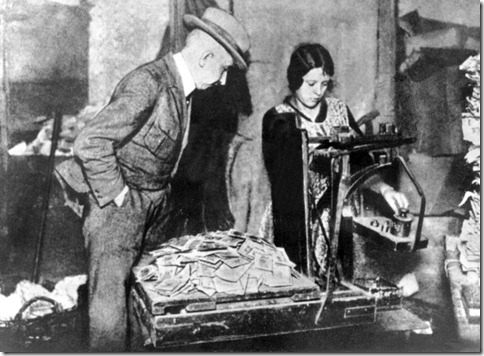 Germany has, tacitly and automatically, already loaned € 547 Billions to Southern European countries. Add to this the hundreds of Billions in bonds the European Central Bank already bought, in violation of their charter. Germany is responsible for 27% of all these. For more if other guarantors fail to pay. In addition to Germany being a net payer for the EC budget, year by year, to aid moneys to weaker countries. Plus German guarantees for Greek and other bonds that probably will never be paid.back.
Germany has, tacitly and automatically, already loaned € 547 Billions to Southern European countries. Add to this the hundreds of Billions in bonds the European Central Bank already bought, in violation of their charter. Germany is responsible for 27% of all these. For more if other guarantors fail to pay. In addition to Germany being a net payer for the EC budget, year by year, to aid moneys to weaker countries. Plus German guarantees for Greek and other bonds that probably will never be paid.back.
Most significantly for German public opinion, Weidmann’s message spoke about possible losses for the Eurosystem of member-country central banks caused by growing internal imbalances among European central banks generated by capital flight from southern EMU members. Weidmann’s letter, which found its way into the columns of the conservative Frankfurter Allgemeine Zeitung newspaper, appeared to suggest more secure collateralization for the overall ECB credits to weaker EMU central banks, which now amount to more than €800 billion under the ECB’s Target-2 electronic payment system.
The latest Bundesbank figures show that the Bundesbank’s share of these credits rose from €498 billion to €547 billion in February, pointing to continued capital flight from the southern to the northern members of EMU. Weidmann reawakens debate on Bundesbank’s power
The German Bundesbank is owed € 547 Billion in target claims the European Central Bank. This is € 13,000 Euro per employed German.
Our life insurance policies and savings accounts now are owed more than 13,000 € per German worker from open target claims against the other central banks in the euro zone. These demands can not be made due, get an interest rate below inflation, and will prove to be wholly or partially worthless, if the Euro breaks or if Euro countries go bankrupt. 2
 The world blames Germany for attaching conditions to loaning or rather giving away money they legally should never give in the first place. The world wants Germany to bail out all of Europe, to give enormous guarantees that some day might become due as true financial liabilities for Germany. Risk Germany’s bankruptcy to bail out Europe.
The world blames Germany for attaching conditions to loaning or rather giving away money they legally should never give in the first place. The world wants Germany to bail out all of Europe, to give enormous guarantees that some day might become due as true financial liabilities for Germany. Risk Germany’s bankruptcy to bail out Europe.
Saving the Euro
Germany’s Central Bank against the World
Jens Weidmann, the new president of Germany’s Bundesbank, is strongly opposed to making the European Central Bank the lender of last resort in efforts to prop up the common currency. It’s a lonely fight, however, and the pressure from Germany’s European partners is intense. Some warn that Weidmann’s course could end up destroying the euro. By SPIEGEL Staff.
Hasn’t the Euro already been destroyed by insane spending and borrowing? World wide, governments borrow money with no intent to ever pay it back. Rather they pay it with the next loan.
And then they are unable to afford the new loan because the interest increased. This is not unexpected, it has caused insolvency in Latin America 20 years ago.
Banks are allowed to gamble with other people’s savings, leverage with central bank money, invent fraudulent derivatives with false ratings. Then countries go bankrupt for bailing out banks. Against all rules of capitalism.
Jens Weidmann, the 43-year-old president of Germany’s central bank, the Bundesbank […]: The ECB, Weidmann said, has only one purpose, namely "to keep prices stable."
One man is bracing himself against the storm. In the battle to save the euro, Europe’s monetary watchdogs are under growing pressure from around the world to buy up unlimited quantities of the sovereign bonds of ailing member states. But the head of the Bundesbank is saying no, and he is making his message loud and clear, not only in Berlin, but also in Brussels, Paris and Washington. If the ECB gave in to the pressure, Weidmann argues, it would not only be violating European treaties and the German constitution. Such a move would also be "synonymous with the issuance of euro bonds." […] 3
Now countries are bailing out other countries. This is in plain violation of the no-bailout clause in the EU treaty. The European Central Bank buys loans from southern European countries, against their own regulations.
Europe’s politicians are running out of options to save the euro. They have already put together half a dozen bailout packages and come up with half a trillion euros. The heads of six governments have been toppled or have resigned. Many of the principles on which the common currency was once based have been violated, ranging from the ban on assuming the debts of other countries to the requirement to keep the euro zone’s central bank out of politics.
Breaking the rules has become standard practice, but to no avail. Greece is closer to leaving the euro zone than ever before, and Italy seems to be drifting inexorably toward a national bankruptcy. 3
Constantly breaking all the rules with indescribable amounts of money. Trusting that the average citizen hardly notices immense difference between millions, billions and trillions (1,000,000 millions).
Since Weidmann took office six months ago, he has not made the slightest impression that he is dependent on the chancellor and her administration. Only a few weeks after taking the helm at the Bundesbank, he went on the offensive against the euro members’ bailout policy and also against the majority in the ECB’s Governing Council.
Amazing. One man with principles. Unfortunately very late: the entire world, all countries, including Germany have ballooned their sovereign debt to morally indefensible amounts.
But if most European politicians have their way, in the future the ECB will vouch for all of the outstanding debt of the debtor nations, permanently, to an unlimited extent and in violation of all applicable laws. Their recipe is to print money and drown the debt crisis in a sea of liquidity.3
"Insolvenzverschleppung", delaying insolvency is a crime in Germany. But the world is doing this since Greenspan. Any monetary trouble will be repressed by printing or borrowing more money.
The ECB has made two rounds of emergency three year loans totalling just over €1 trillion ($1.31 trillion). The step has been credited with helping ease Europe’s government debt crisis. Bundesbank’s Weidmann: ECB needs exit plan for massive support to banks, markets
1 trillion Euro! 1000 Billion Euro. This money at lowest interest rate creates havoc in Brazil and in other world economies.
One of the biggest fears of critics of the bond-purchase programs is that they will deprive governments of any incentive to sort out their finances on their own. When the ECB decided in August to buy Italian bonds, Berlusconi, trusting in the Frankfurt-based rescuers, cut back his austerity program. As in the case of Greece, valuable time was lost without structural reforms being addressed — and everything just got worse.
"Here in Europe, we spent a year and a half talking about irrelevant alternatives," says former Bundesbank President Axel Weber, who is currently teaching at the University of Chicago and is in a position to express inconvenient truths. "All previous ideas follow the principle: How can I use other people’s money to help myself?" 3
The tragedy of the commons, simple greed, political opportunism, democratic crowd pleasing for re-election. All this led to the current situation, with world wide economic disaster looming.
So it’s Alex Weber, eh? Wow.Remind me to go long the Euro and short the DAX. (I don’t get the Germans they still like Merkel but hate her party.)The tragic part is that this means that Bernanke will need to denfed the dollar with high rates, or risk a dollar-run (again). The currency arbitrage is going to be perceived as core inflation risk. Bernanke & FOMC don’t have the courage to allow this, so they’ll denfed the dollar with high rates. And that means the Fed deficits will explode again as we lose more tax revenue, unemployment costs go up, and social sec/medicare continue their inexorable inflation-indexed march toward swallowing up the entire US GDP.Meanwhile, Bernanke is having a lot of trouble financing the huge US deficit, as observed by the weakness in last week’s bond auctions even in the middle of a flight-to-safety (courtesy of Greece). Perceived US credit risk is growing.If perceived US credit risk takes center stage, we’ll see US interest rates spike rapidly. The more Bernanke does to denfed the dollar today, the worse it gets (although, to be fair to him does he deserve fairness? he can’t control the dollar-indexed US transfer payment obligations).I wonder how popular Austrian economic theory is in Germany? Or maybe the Germans just like buying up American beer companies with fat Euros.